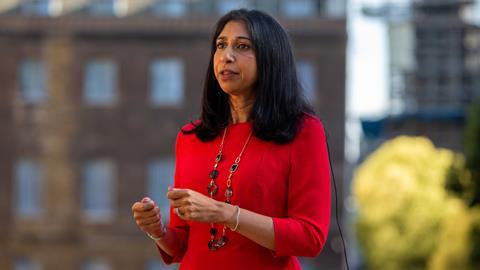Equality laws have been 'misconstrued and weaponised to fight those who challenge their views as perpetrators of hate speech', the attorney general said on Wednesday, pledging to bring clarity to the law governing the protection of single-sex spaces. In a widely trailed speech to thinktank Policy Exchange, Suella Braverman QC said she had found 'many concerning examples of how inclusion has trumped fairness'.
Warning against 'the gold-plating of the protected characteristic of gender reassignment', she said that the government would publish guidance to schools reminding them they have no legal obligation to address children by their preferred pronouns, names, or admit them to opposite sex toilets, sport teams, or dormitories.
In the run-up to the parliamentary debate on the government's Bill of Rights, Braverman cited the 'rich heritage of rights in the UK'. But she said that this had been threatened by 'the long tail of Blairism' - the 1998 Human Rights Act. 'There is a now serious risk that the fight for rights undermines democracy and harms the very people for whom the fight was intended to benefit,' she said, asking 'is it always right that minority groups impose their claims upon the rest of society? We need to make sure that the costs of protecting rights are worth the pay-off.'
Braverman cited 'three areas where the conflict of rights has played out unsatisfactorily: first, the use of the judicially expanded European Convention on Human Rights to obstruct the government’s action on illegal migration, secondly the use of human rights and its legal test of ‘proportionality’ as a defence to criminal damage charges - such as the Colston statue trial - and thirdly 'the gold-plating of the protected characteristic of gender reassignment in the context of single sex spaces'.
On the final point, she said 'some service providers behave as if they have a legal duty to admit biological males who identify as females into women-only spaces, from rape crisis centres and domestic abuse refuges to bathrooms and changing rooms. In my view this is not in accordance with the law.'
'True diversity and equality are at risk when, as a society, we divide everyone into separate groups and then silence views which may challenge those groups. This is not what democracy is about and it is not what the law requires.'
Finally, she said, the place to resolve controversies about the scope of competing human rights is parliament, not the court. 'Parliament – the voice of the people and the original source of law – must answer these profound questions. And clarity of law is vital to achieve that goal.'
This article is now closed for comment.




























19 Readers' comments